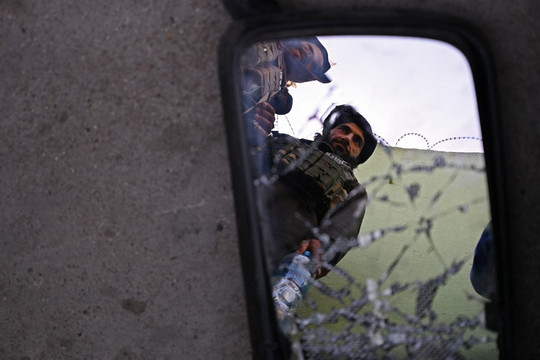By Anthony Bellanger, General Secretary, International Federation of Journalists (IFJ).
This Opinion was jointly published by Mediapart, L'Humanité, Le Soir, Le Temps, the Sydney Morning Herald, Lamrea.com, the Canberra Times and InfoLibre on 2 October 2021.
Just two weeks after August 31, 2021, the date set by the U.S. administration to leave Afghanistan, the Ministry of Women's Affairs was replaced by the Ministry of Promotion of Virtue and Prevention of Vice in a government that no longer includes any woman. This is a morbid throwback from their years of learning about power between 1996 and 2001. Women can now only leave the family home to go to the mosque.
And after women, journalists have become the target.
In recent days, Qari Muhammad Yousuf Ahmadi, acting director of the Government Media and Information Center (GMIC) and long-time Taliban spokesman, unveiled 11 rules for journalists.
The first rule sets the tone: "Topics that contradict Islam must not be broadcast.” The following points are of the same nature and confirm, for those who have not yet understood, that the new media bosses are the Taliban and them alone.
Ahmadi added that "issues that are not confirmed by officials during the broadcast should be handled with care"; that "issues that have a negative impact on the public mind and can affect the morale of the people should be handled with care during the broadcast”. Finally, he warned that from now on, "the media will prepare detailed reports in coordination with the government media center GMIC...".
The fuse has been lit before the firestorm of censorship and repression.
What future awaits journalism and journalists in Afghanistan?
How many more days before there are only journalists paid by the Taliban regime? How many more days before ALL women disappear from the newsrooms for good?
At the time of writing, two women still work in a local TV station in Kandahar, a handful in Kabul, and a few more in Herat and Jalalabad.
Who can still believe Taliban claims that they have changed since 2001 when we see the violence perpetrated against dozens of journalists who have dared to cover women's demonstrations?
Who can still be so naive?
Since August 12, the International Federation of Journalists (IFJ), the world's largest professional organization representing more than 600,000 journalists in 150 countries, has work to move several hundred journalists to safety after receiving thousands of distress messages. Thanks to its member unions, a number of Afghan journalists were able to obtain humanitarian visas and reach Europe, the United States, Canada, Australia, Qatar, India and especially Pakistan.
These were emergency solutions for some of those most at risk and their families, who have left everything behind.
But what comes next? What future can they have in a host country where they may not speak the language and where beyond the promise of safety they are offered little by governments fearful of a political backlash.
The IFJ has been overwhelmed by donations to its IFJ Safety Fund from journalists and their unions around the world. But even this is just a drop in the ocean compared to the desperate requests for assistance.
There are still thousands journalists on the ground, in all regions, being actively supported by the Afghan Independent Journalists Association (AIJA) and the Afghan National Journalists Union (ANJU), the IFJ’s two affiliates. For the most part they are those who have not been able to flee (yet) or who did not want to leave, because they want, despite the risk to their lives, to continue their reporting in the field and bear witness to a historic political upheaval.
The trap of Taliban politics for the media is closing on the last representatives of journalism in Afghanistan. Without glorifying the last 20 years of American occupation, they all agree that there had been advances in media and social rights, even if patriarchy coupled with religion ultimately held power.
More than 120 media outlets have already folded, are no longer allowed to broadcast or no longer have the economic means to operate, as advertising has disappeared.
Unemployment among journalists is estimated at between 70 and 80 percent, and those who try to fulfill their mission of informing the public receive warnings and death threats by phone and mail from terrorist groups and local Taliban officials.
What will be left of the Afghan media after 20 years of apparent freedom of information, when the country already sits close to the top of the the IFJ's annual list of murdered journalists: 10 were victims of religious barbarism in 2020 - the second most dangerous country after Mexico. How can we also ignore the heinous and despicable murder of three women journalists on March 3?
What future awaits journalism and journalists in Afghanistan?
The UN Secretary General has stressed the absolute necessity to welcome Afghan refugees, but we must go further.
The IFJ is today calling on the Director General of UNESCO, Audrey Azoulay, to take a stand to ensure the protection and safety of journalists in Afghanistan, both foreign and local reporters, who are on the front line.
The IFJ is also calling on the UN High Commissioner for Human Rights, Michele Bachelet, to ensure that independent journalism is safeguarded in Afghanistan, as a public good and one of the essential human rights for the maintenance of democracy.
The light of independent information must not be extinguished in Afghanistan.
"Totalitarian regimes have no better allies than lassitude and oblivion. Our watchwords are therefore obvious: memory and obstinacy," wrote Albert Camus, a French writer and journalist, in his message to Hungarian writers in exile in 1957.
All of us, the International Federation of Journalists and UN agencies, are accountable and responsible for the future of Afghan journalists – men and women.
Let’s not forget them. Let’s persist in shining a light. Let’s act. Let's do it now.
A.B.

